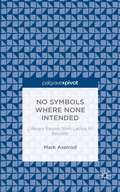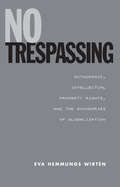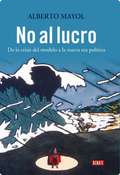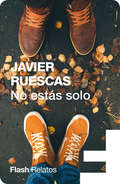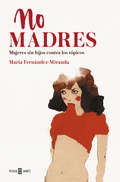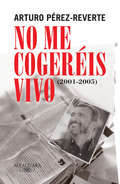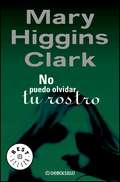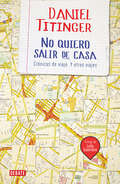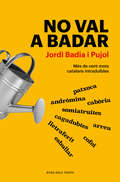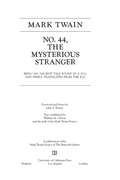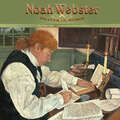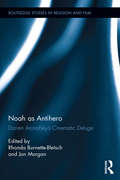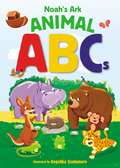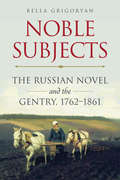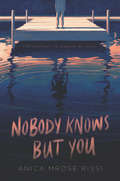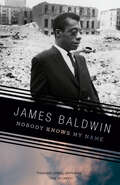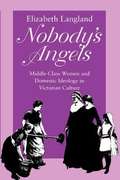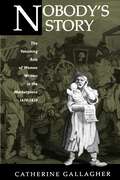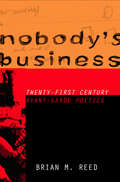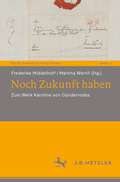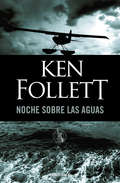- Table View
- List View
No Symbols Where None Intended: Literary Essays from Laclos to Beckett
by Mark AxelrodAn homage to Nabokov's Lectures on Literature, this collection of essays sheds new light on canonical authors such as Ibsen, Beckett, and Strindberg. Using style and structure as the connective thread, Mark Axelrod joins a wide and deep conversation on writers on writing.
No Trespassing
by Eva Hemmungs WirténIn this scholarly yet highly accessible work, Eva Hemmungs Wirtén traces three main themes within the scope of cultural ownership: authorship as one of the basic features of print culture, the use of intellectual property rights as a privileged instrument of control, and finally globalization as a pre-condition under which both operate. Underwritten by rapid technological change and increased global interdependence, intellectual property rights are designed to protect a production that is no longer industrial, but informational.No Trespassing tells the story of a century of profound change in cultural ownership. It begins with late nineteenth-century Europe, exploring cultural ownership in a number of settings across both spatial and temporal divides, and concludes in today's global, knowledge-based society. Wirtén takes an interdisciplinary and international approach, using a wide array of material from court cases to novels for her purposes. From Victor Hugo and the 1886 Berne Convention, to the translation of Peter Høeg?s bestseller Smilla's Sense of Snow, Wirtén charts a history of Intellectual property rights and regulations. She addresses the relationship between author and translator, looks at the challenges to intellectual property by the arrival of the photocopier, takes into account the media conglomerate's search for content as a key asset since the 1960s, and considers how a Western legal framework interacts with attempts to protect traditional knowledge and folklore. No Trespassing is essential reading for all who care about culture and the future regulatory structures of access to it.
No al lucro: De la crisis del modelo a la nueva era politica
by Alberto MayolUn ensayo incisivo y valiente que devela las falencias y la renovación del modelo político y social chileno. No al lucro es un ensayo incisivo y valiente, cuyo objetivo es analizar cómo la historia reciente de Chile ha estado rodeada de una serie de poderes -la dictadura, la Iglesia, los políticos, entre otros- que han influido en una sociedad, según el autor, despolitizada y afín a seguir el rumbo de los acontecimientos sin despertar de una modorra cómoda e indolente. Sin embargo, luego de las recientes manifestaciones en pro de una educación de calidad, por la igualdad y por un Chile preocupado del medioambiente, y en un siglo más informado como el XXI, la ciudadanía ha sufrido un cambio profundo: una nueva era política se está desarrollando. Alberto Mayol sin pelos en la lengua da cuenta de un Chile que ha estado sometido a las leyes del mercado, pero que poco a poco está despertando dejando entrever la crisis del sistema, pero también las nuevas posibilidades futuras.
No estás solo
by Javier RuescasNo estás solo retrata un tema de plena actualidad del que todos hemos oído hablar: el acoso a través de las redes sociales entre los jóvenes. Escrito íntegramente en forma de conversaciones de Whatsapp, a modo de diario, el autor reflexiona sobre las dinámicas del bullying y la posibilidad de superarlo a través de la denuncia y el apoyo entre compañeros. Todo iba bien en la vida de Guillermo: tenía un grupo de amigos de clase y ensayaba con ellos en un grupo de música. Pero la llegada al grupo de otro chico, Borja, convierte repentinamente la vida del protagonista en un infierno. El acoso comienza a ser constante y Guillermo pasa a ser el blanco de todas las burlas en un chat de Whatsapp llamado «Los amos de la clase», un grupo creado para humillarle y del que no le permiten salir. Los chicos, además, pasan a ridiculizarlo por ser gay y a amenzarle con contárselo a todo el mundo en el instituto. Solo y ya sin amigos, Guillermo encuentra su único apoyo en Karen, una estudiante norteamericana recién llegada al instituto, quien también sufre los insultos y desprecio de este grupo de chicos por ser nueva y diferente. A través de las conversaciones de whatsapp entre Karen y Guillermo vemos la gran complicidad que se llega a crear entre ambos, reflejando la importancia de encontrar aliados entre los compañeros de clase.
No madres
by María Fernández-MirandaSer o no ser madre, esa es la cuestión para tantas y tantas mujeres... Esta es la historia de María Fernández-Miranda, pero también de otras mujeres como Soledad Lorenzo, Rosa Montero, Maribel Verdú, Mamen Mendizábal, Carmen Ruiz, Inka Martí, Paula Vázquez, Almudena Fernández, Sandra Ibarra y Alaska, que explican por qué no son madres con la esperanza de que un futuro cercano ninguna mujer tenga que dar explicaciones al respecto. «Junto a tantas supermadres, también hay mujeres (cada vez más) que no quieren tener hijos, y hay mujeres que no pueden tener hijos. Yo he pertenecido a ambos bandos [...]. Y en este proceso de aceptación sólo me ha ayudado una cosa: escuchar a las que se encuentran en mi mismo barco, a las que por distintas razones no han podido o no han querido tener descendencia. Lo que pasa es que me ha costado encontrarlas, porque casi todas están calladas, sepultadas bajo la avalancha de blogs, libros y tuits que machaconamente debaten sobre pañales y biberones, como si nunca antes en la historia de la humanidad hubiesen existido las mujeres que dan a luz. Y yo me pregunto: ¿acaso no ha llegado la hora de que nosotras también expresemos cómo nos sentimos?»María Fernández-Miranda Los seres humanos nacen, crecen, se reproducen y mueren, nos hacían repetir en clase. Pero las estadísticas afirman que casi un 30% de las mujeres nacidas en la década de los 70 no tendrá hijos. Un colectivo tan numeroso como poco visibilizado, que ni siquiera cuenta con un nombre propio para definirse y tiene que hacerlo desde la negación: no madres. María Fernández-Miranda nunca sintió eso que llaman instinto maternal y, sin embargo, se sometió a siete fecundaciones in vitro. Esta experiencia le hizo reflexionar acerca de los motivos por los que tenemos hijos y tomar conciencia de los tópicos que convierten la maternidad en destino ineludible para toda mujer. Un valioso aprendizaje en el que descubrió que no estaba sola, sino que las no madres habían permanecido calladas por demasiado tiempo. Y consiguió que su historia individual se transformase en un relato coral en el que Soledad Lorenzo, Rosa Montero, Maribel Verdú, Mamen Mendizábal, Carmen Ruiz, Inka Martí, Paula Vázquez, Almudena Fernández, Sandra Ibarra y Alaska le prestan su voz para reivindicar el derecho a no ser juzgadas. Porque este no es un libro en contra de la maternidad, sino en defensa de la libertad de elección. Ser no madre no constituye ninguna anomalía y ellas son el mejor ejemplo posible de que cuando la puerta de la maternidad se cierra (o ni siquiera se abre), lo que queda no es el vacío, sino la posibilidad de desarrollar una vida diferente, feliz y completa.
No madres: Mujeres sin hijos contra los tópicos
by María Fernández-MirandaSer o no ser madre, esa es la cuestión para tantas y tantas mujeres... Esta es la historia de María Fernández-Miranda, pero también de otras mujeres como Soledad Lorenzo, Rosa Montero, Maribel Verdú, Mamen Mendizábal, Carmen Ruiz, Inka Martí, Paula Vázquez, Almudena Fernández, Sandra Ibarra y Alaska, que explican por qué no son madres con la esperanza de que un futuro cercano ninguna mujer tenga que dar explicaciones al respecto. «Junto a tantas supermadres, también hay mujeres (cada vez más) que no quieren tener hijos, y hay mujeres que no pueden tener hijos. Yo he pertenecido a ambos bandos [...]. Y en este proceso de aceptación sólo me ha ayudado una cosa: escuchar a las que se encuentran en mi mismo barco, a las que por distintas razones no han podido o no han querido tener descendencia. Lo que pasa es que me ha costado encontrarlas, porque casi todas están calladas, sepultadas bajo la avalancha de blogs, libros y tuits que machaconamente debaten sobre pañales y biberones, como si nunca antes en la historia de la humanidad hubiesen existido las mujeres que dan a luz. Y yo me pregunto: ¿acaso no ha llegado la hora de que nosotras también expresemos cómo nos sentimos?»María Fernández-Miranda Los seres humanos nacen, crecen, se reproducen y mueren, nos hacían repetir en clase. Pero las estadísticas afirman que casi un 30% de las mujeres nacidas en la década de los 70 no tendrá hijos. Un colectivo tan numeroso como poco visibilizado, que ni siquiera cuenta con un nombre propio para definirse y tiene que hacerlo desde la negación: no madres. María Fernández-Miranda nunca sintió eso que llaman instinto maternal y, sin embargo, se sometió a siete fecundaciones in vitro. Esta experiencia le hizo reflexionar acerca de los motivos por los que tenemos hijos y tomar conciencia de los tópicos que convierten la maternidad en destino ineludible para toda mujer. Un valioso aprendizaje en el que descubrió que no estaba sola, sino que las no madres habían permanecido calladas por demasiado tiempo. Y consiguió que su historia individual se transformase en un relato coral en el que Soledad Lorenzo, Rosa Montero, Maribel Verdú, Mamen Mendizábal, Carmen Ruiz, Inka Martí, Paula Vázquez, Almudena Fernández, Sandra Ibarra y Alaska le prestan su voz para reivindicar el derecho a no ser juzgadas. Porque este no es un libro en contra de la maternidad, sino en defensa de la libertad de elección. Ser no madre no constituye ninguna anomalía y ellas son el mejor ejemplo posible de que cuando la puerta de la maternidad se cierra (o ni siquiera se abre), lo que queda no es el vacío, sino la posibilidad de desarrollar una vida diferente, feliz y completa.
No me cogeréis vivo (2001-2005)
by Arturo Pérez-ReverteLos artículos más combativos de uno de nuestros autores capitales. «Escribo con tanta libertad que me sorprende que me dejen.» Este libro recoge los artículos publicados por Arturo Pérez-Reverte en la revista El Semanal desde finales del año 2001 hasta el 2005. «... Esta página no puede escribirse con bisturí. Carezco de talento para eso. Los ajustes de cuentas se hacen empalmando la chaira y acuchillando en corto, a lo que salga. En poco más de un folio, y con este panorama, uno pelea y apenas tiene tiempo de mirar a cuántos se la endiña. Sigue adelante, y que el diablo reconozca a los suyos. La justificación es que nadie me obliga, ni vivo de esto. Que podría firmar un libro cada dos años y observar la vida desde el escaparate de una librería. Pero ya ven. Unos domingos me divierto horrores, otros me desahogo, y otros digo en voz alta, o lo intento, lo que algunos no tienen medios para decir. Sin embargo, no es posible quedar bien con todos. Aquí no caben florituras ni sutilezas, si vas a lo que vas. Y menos en esta triste España, donde la gente sólo se da por aludida cuando le pateas los cojones. Pero mochar parejo trae daños colaterales. Víctimas inocentes. La justificación es que uno da la cara y se la juega sin red, sin Dios ni amo, en vez de llevárselo muerto por poner la foto y marear la perdiz, o por hacerle a los demagogos y mangantes que cortan el bacalao -o a quienes pretenden cortarlo- un francés con todas sus letras...»Arturo Pérez-Reverte
No puedo olvidar tu rostro
by Mary Higgins ClarkLa abogada Kerry Macgrath acompaña a su hija Robin a la consulta de un cirujano estético. Mientras aguarda en la sala de espera ve salir a una mujer cuya cara le resulta familiar. Este hecho casual se convertirá en inquientante cuando, en las sucesivas visitas a la consulta del doctor Smith, Kerry continúe viendo esa misma cara... pero en diferentes personas. La abogada decide investigar, sin imaginar que está a punto de internarse en un laberinto mortal de engaños y crímenes cuyo hilo de Ariadna se remonta al asesinato de una bella joven once años atrás...«La Agatha Christie americana.»El Mundo
No quiero salir de casa
by Daniel Titinger"Titinger parte de una foto fija -una teoría-, la clava contra una pared y, a través de un paciente trabajo de reportero, despelleja esa foto capa tras capa hasta dejarla en los huesos. Y luego vuelve a montarla. A su manera." Leila Guerriero No quiero salir de casa. Crónicas de viaje. Y otros viajes, es una aproximación al arte de irse y retornar. Cada texto implica no solo un desplazamiento geográfico, sino también un recorrido emocional que el autor construye con historias delirantes, datos precisos y personajes de alguna forma notables. Es en la trashumancia donde encontramos la génesis de esta escritura, en el tránsito y la exploración de paisajes disímiles, como el desierto del Sahara, la ciudad de Seattle o el ignoto trópico de Surinam. Hay un segundo traslado en estos textos, y es el abordaje de la topografía íntima de individuos excepcionales cuyas historias bordean la ficción. En cada persona retratada, como en cada lugar visitado, Titinger descubre verdades ocultas, cosmovisiones fragmentadas, mitos que se desdibujan y más de una paradoja. Al mismo tiempo, hay un tercer movimiento: una revisitada a la identidad de los peruanos. las vidas de Kina Malpartida, Sixto Paz o Maju Mantilla; la misteriosa muerte de una manada de camellos en la ciudad de Ica; el discutido origen del pisco y del cebiche; la historia de éxito de Inca Kola; las violentas batallas rituales de Tocto, en Cusco; entre otras historias, dan pistas de la idiosincracia nacional, así como de sus traumas y complejos, y de sus sueños y esperanzas.
No val a badar: Més de cent mots catalans intraduïbles
by Jordi Badia i PujolUn recull de més de cent mots catalans intraduïbles a altres llengües que hem de reivindicar perquè no caiguin en l'oblit. «Andròmina», «rai», «colla», «déu-n'hi-do», «coent», «petar», «cofoi», «patxoca», «nòmer», «somiatruites»... En aquest llibre hi trobareu més d'un centenar de mots d'aquesta mena. I què tenen en comú? Doncs que tots, per una raó o altra, són exclusius de la llengua catalana. I són únics perquè, si els cerquéssim en un diccionari bilingüe, ens costaria Déu i ajut trobar-ne la traducció a les altres llengües. Són allò que podríem anomenar «mots intraduïbles». Per aquest motiu no podem badar i cal que els preservem com un bé preuat. A No val a badar hi trobareu exemples de tots aquests mots usats pels nostres escriptors, al costat d'explicacions sobre els significats, l'origen i l'evolució de cadascun, a més d'una munió de derivats, frases fetes i refranys. La sensació que us deixarà la lectura d'aquest llibre és que tenim una llengua rica i variada però, sobretot, que té recursos per a continuar creixent.
No. 44, The Mysterious Stranger
by Mark Twain John S. Tuckey William M. GibsonThis is the only authoritative text of this late novel. It reproduces the manuscript which Mark Twain wrote last, and the only one he finished or called the "The Mysterious Stranger." Albert Bigelow Paine's edition of the same name has been shown to be a textual fraud.
Noah Webster: Weaver of Words
by Pegi Deitz SheaThis picture book celebrates one of the most important patriots in post-Revolutionary times -- Noah Webster.Most readers know Noah Webster for his dictionary masterpieces and his promotion of a living "American Language" that embraces words and idioms from all its immigrant peoples. But he was also the driving force behind universal education for all citizens, including slaves, females, and adult learners. Speaker of twenty languages, he developed the new country's curriculum, writing and publishing American literature, American history, and American geography. He published New York City's first daily newspaper. As editor, Webster conducted a study and linked disease with poor sanitation. He created the country's first insurance company, established America's first copyright law, and became America's first best-selling author.NCTE Orbis Pictus Honor Book
Noah as Antihero: Darren Aronofsky’s Cinematic Deluge (Routledge Studies in Religion and Film)
by Rhonda Burnette-Bletsch Jon MorganThis collection of essays by biblical scholars is the first book-length treatment of the 2014 film Noah, directed by Darren Aronofsky. The film has proved to be of great interest to scholars working on the interface between the Bible and popular culture, not only because it was heralded as the first of a new generation of biblical blockbusters, but also because of its bold, provocative, and yet unusually nuanced approach to the interpretation and use of the Noah tradition, in both its biblical and extra-biblical forms. The book’s chapters, written by both well-established and up-and-coming scholars, engage with and analyze a broad range of issues raised by the film, including: its employment and interpretation of the ancient Noah traditions; its engagement with contemporary environmental themes and representation of non-human animals; its place within the history of cinematic depictions of the flood, status as an ‘epic’, and associated relationship to spectacle; the theological implications of its representation of a hidden and silent Creator and responses to perceived revelation; the controversies surrounding its reception among religious audiences, especially in the Muslim world; and the nature and implications of its convoluted racial and gender politics. Noah as Antihero will be of considerable interest to scholars conducting research in the areas of religion and film, contemporary hermeneutics, reception history, religion and popular culture, feminist criticism, and ecological ethics.
Noah's Ark Animal ABCs
by ZondervanPlayful and educational, Noah&’s Ark Animal ABCs brings alphabet learning together with a family favorite: the animals of Noah&’s ark!With engaging and eye-popping illustrations of animals for each letter of the alphabet, young readers will love guessing which creature comes next. From Ant to Zebra, this delightful book introduces children to the alphabet and some of the interesting creatures aboard Noah&’s ark. Perfect for parents and children to enjoy together!Noah&’s Ark Animal ABCs:Features easy-to-learn alphabet words and interesting animalsOffers bright, eye-catching illustrations to enhance word memory
Noah's Arkive
by Julian Yates Jeffrey J. CohenA timely rethinking of the archetypal story of Noah, the great flood, and who was left behind as the waters rose Most people know the story of Noah from a children&’s bible or a play set with a colorful ship, bearded Noah, pairs of animals, and an uncomplicated vision of survival. Noah&’s ark, however, will forever be haunted by what it leaves to the rising waters so that the world can begin again.In Noah&’s Arkive, Jeffrey J. Cohen and Julian Yates examine the long history of imagining endurance against climate catastrophe—as well as alternative ways of creating refuge. They trace how the elements of the flood narrative were elaborated in medieval and early modern art, text, and music, and now shape writing and thinking during the current age of anthropogenic climate change. Arguing that the biblical ark may well be the worst possible exemplar of human behavior, the chapters draw on a range of sources, from the Epic of Gilgamesh and Ovid&’s tale of Deucalion and Pyrrah, to speculative fiction, climate fiction, and stories and art dwelling with environmental catastrophe. Noah&’s Arkive uncovers the startling afterlife of the Genesis narrative written from the perspective of Noah&’s wife and family, the animals on the ark, and those excluded and so left behind to die. This book of recovered stories speaks eloquently to the ethical and political burdens of living through the Anthropocene.Following a climate change narrative across the millennia, Noah&’s Arkive surveys the long history of dwelling with the consequences of choosing only a few to survive in order to start the world over. It is an intriguing meditation on how the story of the ark can frame how we think about environmental catastrophe and refuge, conservation and exclusion, offering hope for a better future by heeding what we know from the past.
Noble Subjects: The Russian Novel and the Gentry, 1762–1861 (NIU Series in Slavic, East European, and Eurasian Studies)
by Bella GrigoryanRelations between the Russian nobility and the state underwent a dynamic transformation during the roughly one hundred-year period encompassing the reign of Catherine II (1762–1796) and ending with the Great Reforms initiated by Alexander II. This period also saw the gradual appearance, by the early decades of the nineteenth century, of a novelistic tradition that depicted the Russian society of its day. In Noble Subjects, Bella Grigoryan examines the rise of the Russian novel in relation to the political, legal, and social definitions that accrued to the nobility as an estate, urging readers to rethink the cultural and political origins of the genre. By examining works by Novikov, Karamzin, Pushkin, Bulgarin, Gogol, Goncharov, Aksakov, and Tolstoy alongside a selection of extra-literary sources (including mainstream periodicals, farming treatises, and domestic and conduct manuals), Grigoryan establishes links between the rise of the Russian novel and a broad-ranging interest in the figure of the male landowner in Russian public discourse. Noble Subjects traces the routes by which the rhetorical construction of the male landowner as an imperial subject and citizen produced a contested site of political, socio-cultural, and affective investment in the Russian cultural imagination. This interdisciplinary study reveals how the Russian novel developed, in part, as a carrier of a masculine domestic ideology. It will appeal to scholars and students of Russian history and literature.
Nobody Knows But You
by Anica Mrose RissiThe nail-bitingly intense story of a summer at camp that ends in a disturbing death—and depicts a powerful friendship that won’t ever be forgotten. Perfect for fans of One of Us Is Lying and Broken Things. Kayla is still holding on to Lainie’s secrets. After all, Lainie is Kayla’s best friend. And despite Lainie’s painful obsession with her on-again, off-again boyfriend, and the ways he has tried to come between them, friends don’t spill each other’s secrets. They don’t betray each other’s trust. The murder at the end of the summer doesn’t change all that. Besides—Kayla knows that the truth is not the whole story.
Nobody Knows My Name: Notes Of A Native Son / Nobody Knows My Name / The Fire Next Time / No Name In The Street / The Devil Finds Work (Vintage International #1)
by James BaldwinFrom one of the most brilliant writers and thinkers of the twentieth century comes a collection of "passionate, probing, controversial" essays (The Atlantic) on topics ranging from race relations in the United States to the role of the writer in society.Told with Baldwin's characteristically unflinching honesty, this &“splendid book&” (The New York Times) offers illuminating, deeply felt essays along with personal accounts of Richard Wright, Norman Mailer and other writers. &“James Baldwin is a skillful writer, a man of fine intelligence and a true companion in the desire to make life human. To take a cue from his title, we had better learn his name.&” —The New York Times
Nobody's Angels: Middle-Class Women and Domestic Ideology in Victorian Culture
by Elizabeth LanglandVictoria's accession to the throne in 1837 coincided with the birth of a now notorious gender stereotype-- the Angel in the House. Comparing the position of real women-- from the Queen of England to middle-class housewives-- with their status as household angels, Elizabeth Langland explores a complex image of femininity in Victorian culture. Langland offers provocative readings of nineteenth-century fiction as well as a rare glimpse into etiquette guides, home management manuals, and cookbooks. She traces the implications of a profound contradiction: although the home was popularly depicted as a private moral haven, running the middle-class household-- which included at least one servant-- was in fact an exercise in class management. Drawing on the work of Foucault, Benjamin, and Bourdieu, and of recent feminist theorists, Langland considers novels by Dickens, Gaskell, Oliphant, and Eliot, as well as the memoirs of Hannah Cullwick, a former domestic servant who married a middle-class man. Langland discovers that the middle-class wife assumed a more complex and important function than has ever been recognized. With her substantial power veiled in myth, the Victorian angel mastered skills that enabled her to support a rigid class system; at the same time, however, her achievements unobtrusively set the stage for a feminist revolution. Nobody's Angels reconstructs a disturbing picture of social change that depended as much on protecting class inequity as on promoting gender equality.
Nobody's Perfect
by Hendrie Weisinger Norman M. Lobsenz"I don't know how to tell you this, but..." If we don't actually use these words when we offer criticism, we think them. And implicit in these words is the assumption that however userful a particular criticism is meant to be, it is bound to deflate an ego, hurt someone's feelings or denigrate someone's ability. But there are ways to give positive criticism and get positive results, even in the most delicate situations. Nobody's Perfect will show you how.
Nobody's Story: The Vanishing Acts of Women Writers in the Marketplace, 1670-1920 (The New Historicism: Studies in Cultural Poetics #31)
by Catherine GallagherExploring the careers of five influential women writers of the Restoration and eighteenth century, Catherine Gallagher reveals the connections between the increasing prestige of female authorship, the economy of credit and debt, and the rise of the novel. The "nobodies" of her title are not ignored, silenced, or anonymous women. Instead, they are literal nobodies: the abstractions of authorial personae, printed books, intellectual property rights, literary reputations, debts and obligations, and fictional characters. These are the exchangeable tokens of modern authorship that lent new cultural power to the increasing number of women writers through the eighteenth century. Women writers, Gallagher discovers, invented and popularized numerous ingenious similarities between their gender and their occupation. The terms "woman," "author," "marketplace," and "fiction" come to define each other reciprocally.Gallagher analyzes the provocative plays of Aphra Behn, the scandalous court chronicles of Delarivier Manley, the properly fictional nobodies of Charlotte Lennox and Frances Burney, and finally Maria Edgeworth's attempts in the late eighteenth century to reform the unruly genre of the novel.
Nobody’s Business: Twenty-First Century Avant-Garde Poetics
by Brian M. ReedSince the turn of the new millennium English-language verse has entered a new historical phase, but explanations vary as to what has actually happened and why. What might constitute a viable avant-garde poetics in the aftermath of such momentous developments as 9/11, globalization, and the financial crisis? Much of this discussion has taken place in ephemeral venues such as blogs, e-zines, public lectures, and conferences. Nobody's Business is the first book to treat the emergence of Flarf and Conceptual Poetry in a serious way. In his engaging account, Brian M. Reed argues that these movements must be understood in relation to the proliferation of digital communications technologies and their integration into the corporate workplace.Writers such as Andrea Brady, Craig Dworkin, Kenneth Goldsmith, Danny Snelson, and Rachel Zolf specifically target for criticism the institutions, skill sets, and values that make possible the smooth functioning of a postindustrial, globalized economy. Authorship comes in for particular scrutiny: how does writing a poem differ in any meaningful way from other forms of "content providing"? While often adept at using new technologies, these writers nonetheless choose to explore anachronism, ineptitude, and error as aesthetic and political strategies. The results can appear derivative, tedious, or vulgar; they can also be stirring, compelling, and even sublime. As Reed sees it, this new generation of writers is carrying on the Duchampian practice of generating antiart that both challenges prevalent definitions or art and calls into question the legitimacy of the institutions that define it.
Noch Zukunft haben: Zum Werk Karoline von Günderrodes (Neue Romantikforschung #5)
by Frederike Middelhoff Martina WernliDie literatur- und kulturwissenschaftliche Forschung zu Karoline von Günderrode (1780–1806) setzt seit gut zwei Jahrzehnten neue Akzente. Das Werk der Autorin wird in diesem Zuge als singulärer Beitrag zur Literatur-, Kultur- und Geistesgeschichte der Romantik profiliert, während der ‚Mythos Günderrode‘, der sich auf Leben, Lieben und vor allem Ableben der Autorin konzentriert, fundamental hinterfragt wird. Der vorliegende Band schließt an diese Re-Lektüren und neuen Perspektiven an. Er präsentiert wichtige Untersuchungen zu bislang wenig beleuchteten Facetten von Günderrodes Texten, die u.a. Poetologie, Ästhetik sowie ideengeschichtliche oder politische Aspekte umfassen, und legt zudem eine kommentierte Auswahl bislang kaum bekannter Briefe der Autorin in Transkription und Abbildung vor.
Noche sobre las aguas
by Ken FollettIntriga, pasión y aventura en un thriller de altísima tensión en el que los hilos se entrelazan a bordo de un Boeing 314, por el maestro indiscutible del género: Ken Follett. Septiembre de 1939. Gran Bretaña ha declarado la guerra a Alemania. Aventureros, artistas, hombres de negocios, ciudadanos que huyen de la vejación y la miseria embarcan en el último hidroavión que despega rumbo a Estados Unidos, abandonando un país sobre el que planea la incertidumbre... La noble y fascista familia de los Oxenford huye para evitar la detención del patriarca. A su vez, Diana Lovesey lo hace para escapar con su amante Mark, mientras su marido Mervyn la persigue junto con Nancy Lenehan, que quiere impedir que su hermano Peter malvenda su empresa. Reseñas y comentarios de los lectores:«Follett se eleva hacia un meticuloso final con precisión aeronáutica.»Publishers Weekly «La novela cautiva la atención y es difícil dejar de leerla una vez comenzada. Me ha gustado y lo recomiendo.» «Acción trepidante con episodios románticos conseguidos.» «Intrigante hasta la última página. Como siempre, ¡una novela adictiva! Final divertido e inesperado.»
Noche sobre las aguas
by Ken FollettSeptiembre de 1939. Gran Bretaña ha declarado la guerra a Alemania. Aventureros, artistas, hombres de negocios, ciudadanos que huyen de la vejación y la miseria embarcan en el último hidroavión que despega rumbo a Estados Unidos, abandonando un país sobre el que plantea la incertidumbre... Intriga, pasión y aventura en un thriller de altísima tensión, por el maestro indiscutible del género.
